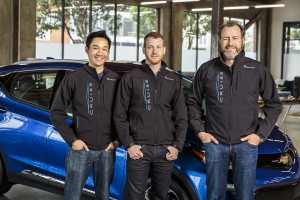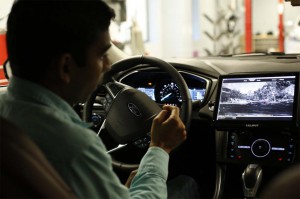
General Motors President Dan Ammann (right) with Cruise Automation co-founders Kyle Vogt (center) and Daniel Kan (left).
General Motors CEO Mary Barra recently suggested the level of change in the auto industry over the next five years will be greater than it has been over the last half-century – and major announcements by both GM and cross-town rival Ford appear to back that up.
The larger of the two makers has acquired Cruise Automation, a California-based start-up focusing on the development of autonomous vehicles. The smaller carmaker, meanwhile, says it is creating a new subsidiary, Ford Smart Mobility LLC, to focus on a wide range of mobility services, including not only autonomous vehicles but alternatives such as ride- and car-sharing.
“Our plan is to quickly become part of the growing transportation services market, which already accounts for $5.4 trillion in annual revenue,” noted Ford CEO Mark Fields in a prepared statement. In a series of stump speeches in recent months, Fields noted that traditional automakers, such as Ford, currently get little to none of that revenue.
GM and Ford are by no means the only manufacturers who envision a dramatically different future for the auto industry. A recent study by the Boston Consulting Group projected a five-fold increase in the number of users for car- and ride-sharing services over the next five years, to 35 million around the world.
By the beginning of the coming decade, meanwhile, the first fully autonomous vehicles are expected to hit the road. The National Highway Traffic Safety Administration recently said it would relax rules to permit faster development of a technology that it believes will yield a sharp reduction in highway fatalities.

A Ford researchers working on "sensor fusion," bringing a mix of technologies, such as laser and cameras, together to let the vehicle "see."
“Fully autonomous vehicles can bring our customers enormous benefits in terms of greater convenience, lower cost and improved safety for their daily mobility needs,” GM President Dan Ammann said in a statement.
(Car, ride-sharing services won’t crimp new car sales. For more, Click Here.)
Like most automakers, GM has been ramping up its investment in self-driving technology for several years, and it plans to launch a semi-autonomous version of the new Cadillac CT6 sedan in 2016.
Cruise Automation focuses on autonomous vehicle software and also tests driverless vehicles in urban environments, where the challenges are considered most severe. The company will work as an independent unit of the Autonomous Vehicle Development unit that GM created earlier this year.
GM isn’t disclosing the price tag for the acquisition, but it announced it would invest $500 million in ride-sharing service Lyft earlier this year – while also buying bankrupt, San Francisco-based Sidecar, and launching the car-sharing service Maven.
Ford’s new Smart Mobility LLC unit will serve as an umbrella for a wide range of different projects covering ventures in connectivity, car- and ride-sharing, and autonomous vehicles, as well as projects aimed at improving the purchase and ownership experience.
(Click Here to see more about Jeep’s Safari concept vehicles.)
“Ensuring the freedom of mobility requires us to continually look beyond the needs of today and interpret what mobility will mean to future generations,” said Ford Chairman Bill Ford.
What all these changes mean for the future is far from certain. The Boston Consulting Group study warned that as motorists get more options they may cut back on the number of vehicles they buy – though a separate study released by Kelley Blue Book this week suggested the impact on car buying may be far less significant.
Part of the uncertainty has to do with the pace at which autonomous vehicles come into widespread use. As a crash last month by a Google self-driving prototype underscored, there are still significant technical challenges ahead. But few experts doubt that autonomous vehicles and other major changes are coming, and they stress the need for manufacturers to prefer for a more diverse, high-tech future.
(Growing number of Americans skipping their licenses and finding alternate transportation. Click Here for the story.)
“A car company that falls behind,” said KBB analyst Karl Brauer, “could end up being the Nokia of the auto industry.”

